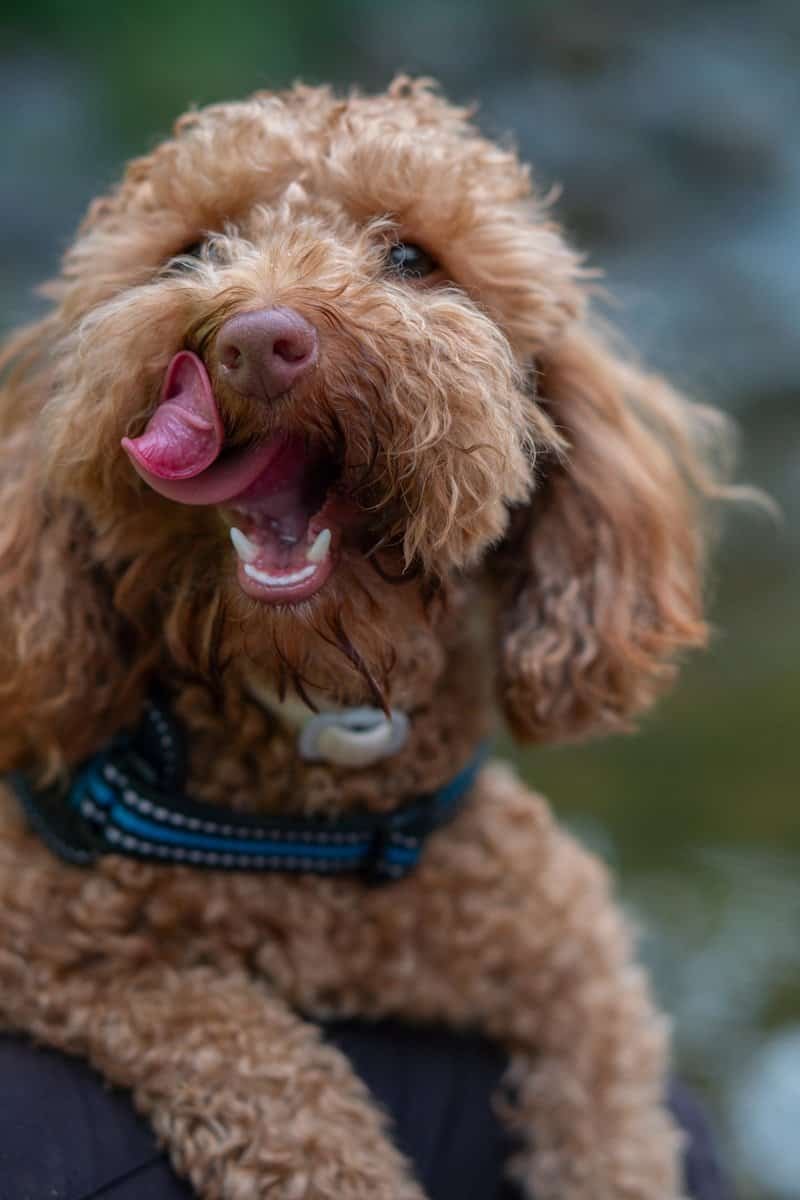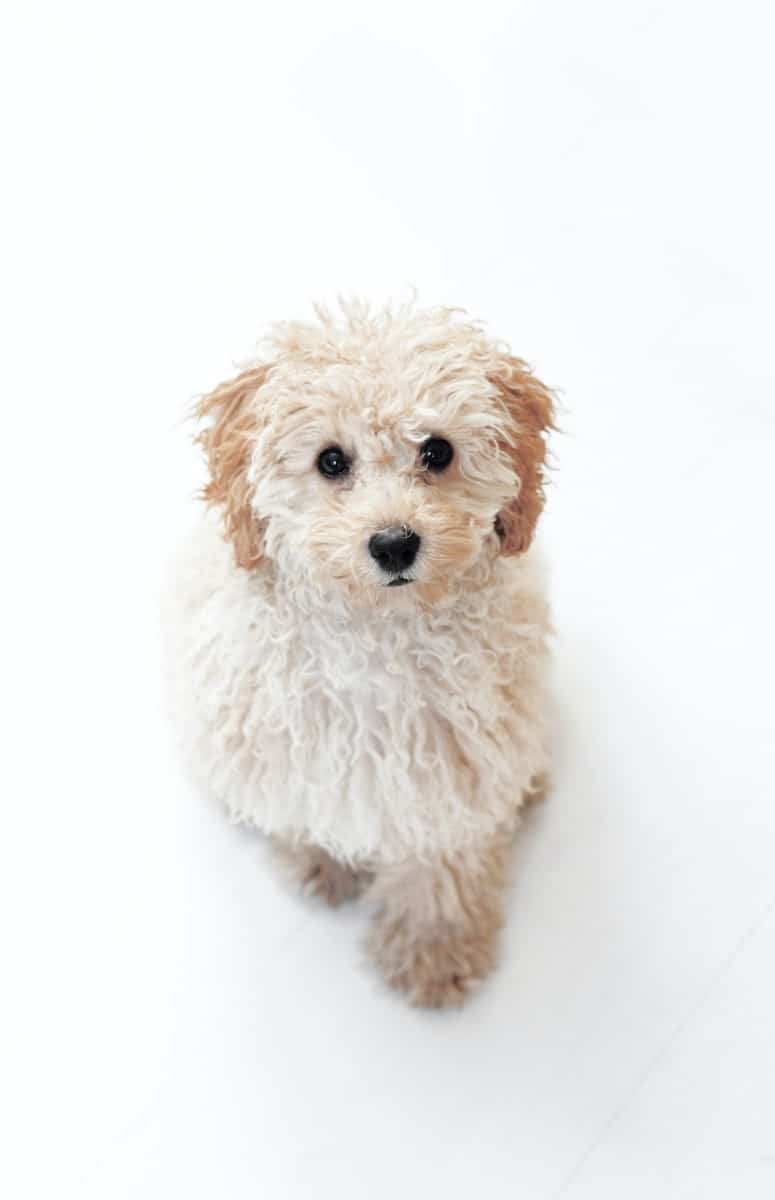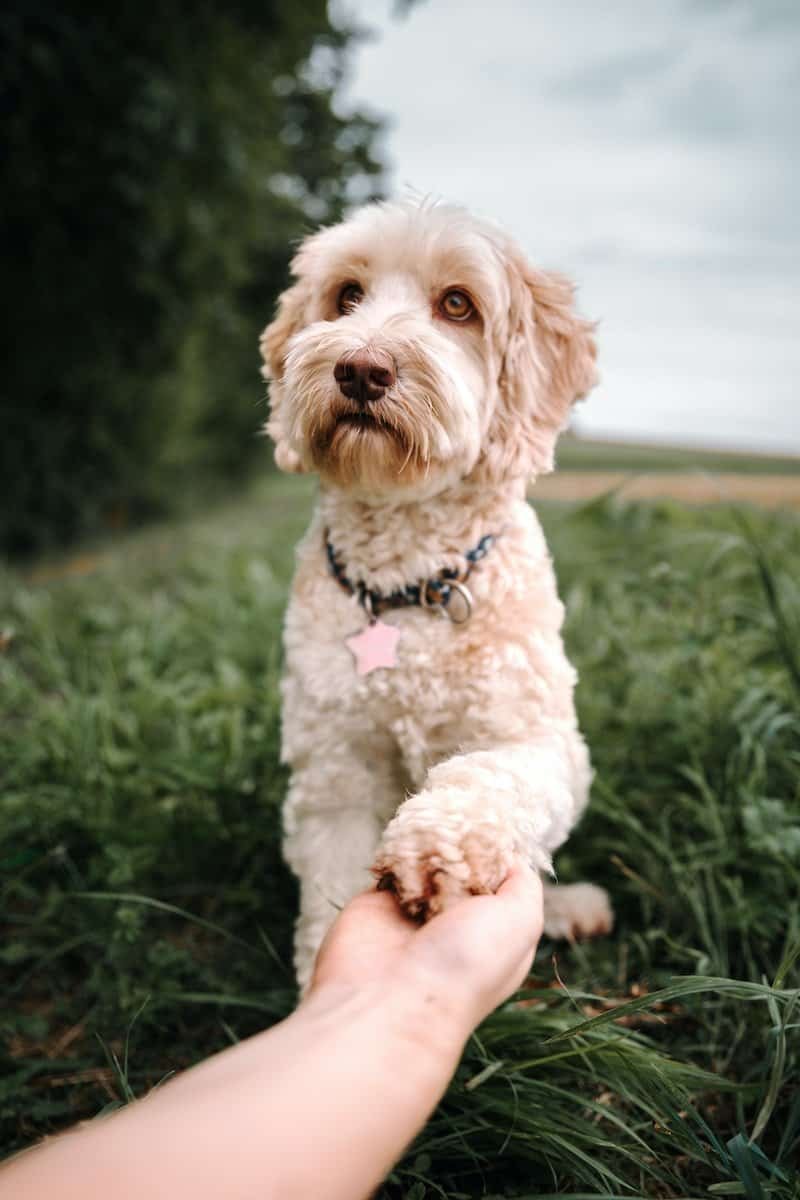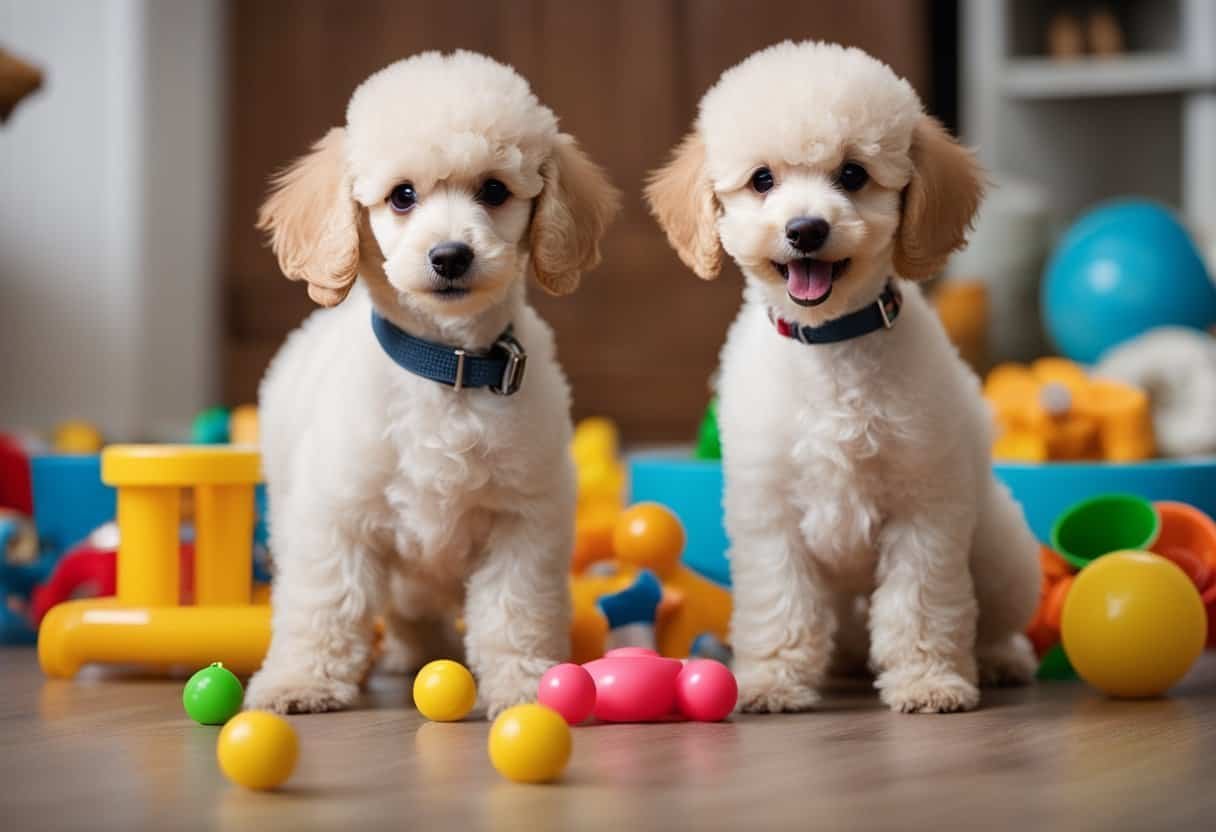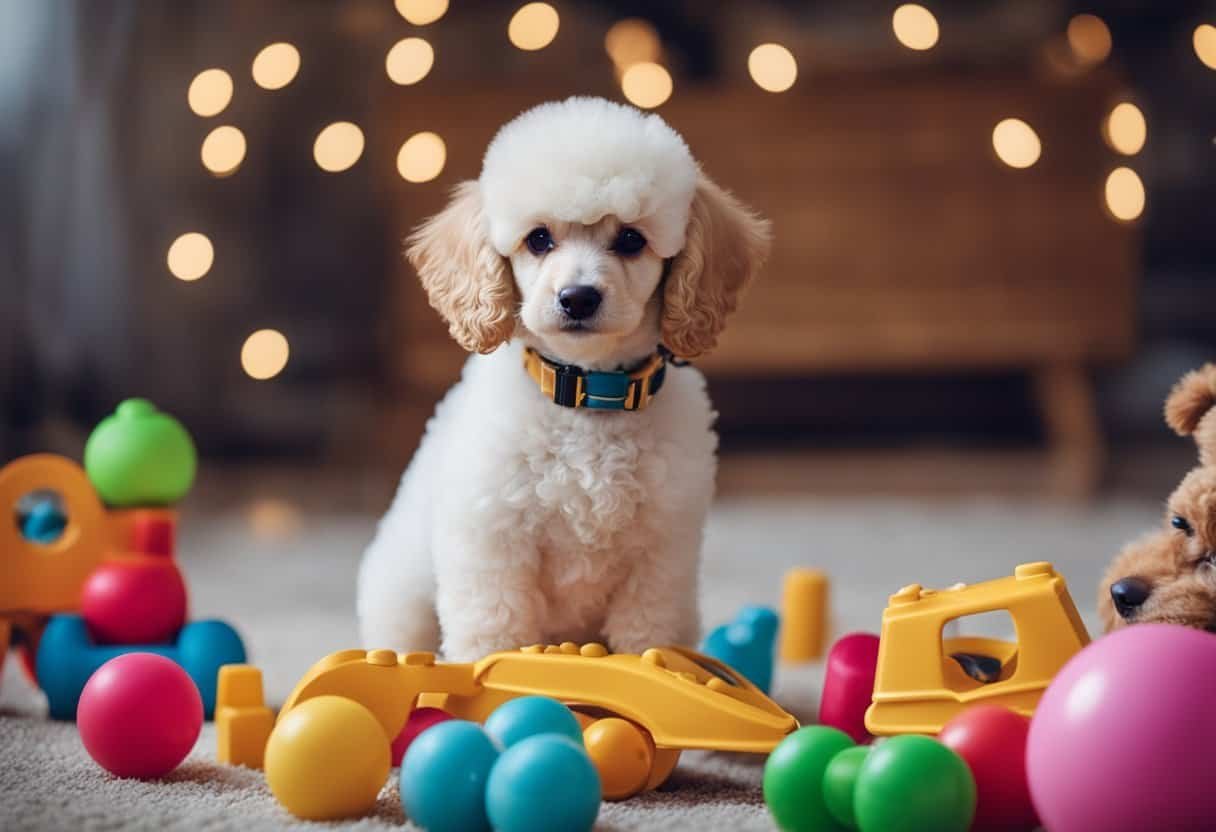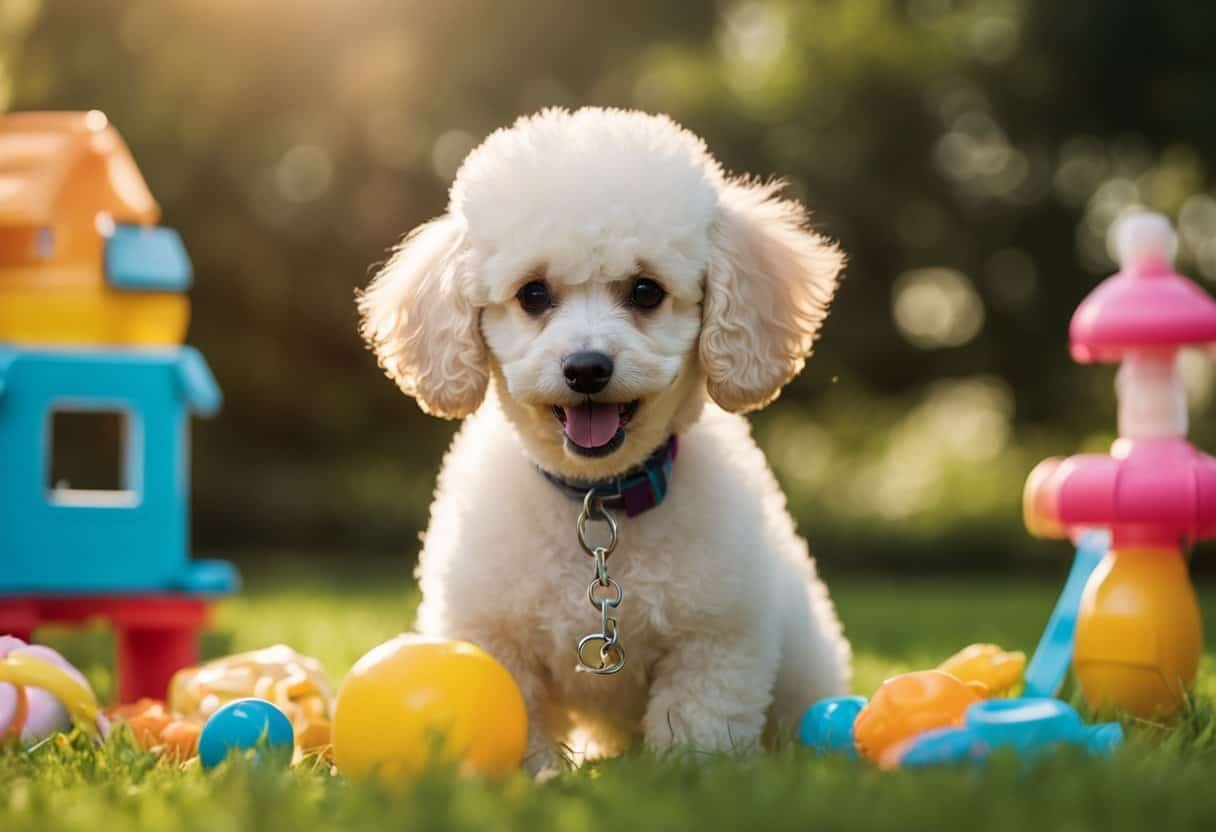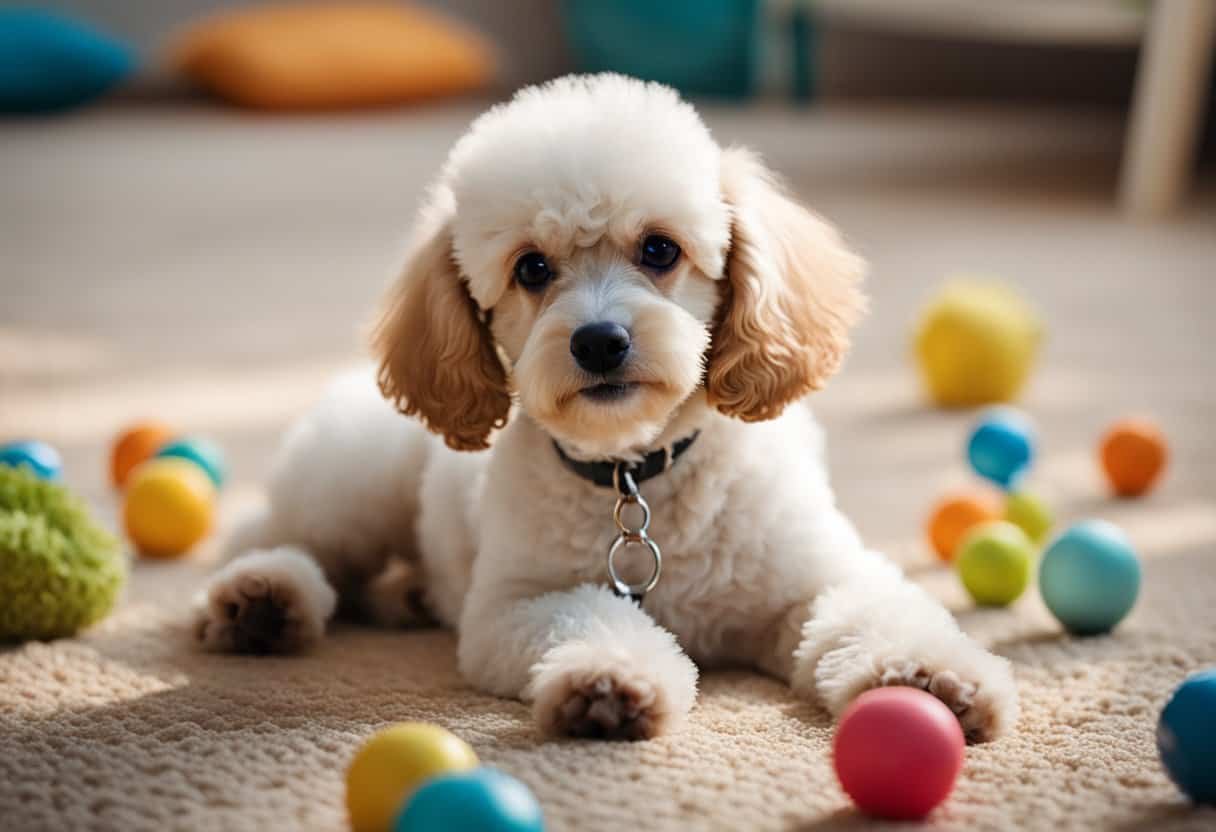
Entering the second year with your poodle puppy is an exciting time filled with significant developmental changes and learning opportunities.
During this period, your poodle will likely reach full size and start showcasing more of their distinctive personality. It’s a critical stage where your consistent training will start to pay off, but it’s also a time to stay vigilant about their health and nutrition as they transition from puppyhood to adulthood.

Maintaining a routine is crucial to this phase of your poodle’s development.
Introduce new forms of physical and mental stimulation to keep your poodle engaged and happy.
Continue reinforcing good behavior with positive training techniques, and remember to practice patience as your poodle masters the complexities of growing up.
With your guidance and understanding, your puppy’s second year can be a formative and joyous time that sets the stage for a well-adjusted, healthy adult poodle.
Key Takeaways
- Poodles approach full size and show more personality in the second year.
- Consistency in training and routine supports your poodle’s growth.
- Introducing varied stimulation aids in your poodle’s developmental milestones.
About This Guide
- Real Experience: Written by poodle enthusiasts with years of hands-on experience caring for and training poodles.
- Expert Reviewed: Content verified by certified dog trainers and veterinary professionals.
- Fact-Checked: Information sourced from the AKC, veterinary journals, and breed specialists.
- Last Updated: November 2025
Understanding Poodle Puppy Development
Your Poodle puppy’s second year is a period filled with significant growth and development. This time is crucial for reinforcing the training and socializing foundations laid during their earlier months.
Developmental Milestones
By the time your Poodle reaches age one and heads into year two, they should have achieved most of their developmental milestones. These milestones include responding reliably to basic commands like sit, stay, and come.
During this phase, your puppy may also show improved impulse control and a clearer understanding of boundaries within your home.
Physical Changes
Physically, Poodles have typically reached their full size by 24 months, but some may continue to fill out in muscle tone and girth.
You’ll notice that their coat may change in texture, requiring regular grooming to maintain its condition. Pay attention to their diet too, as their energy levels may fluctuate as they transition from puppyhood to adulthood.
Behavioral Expectations
Behaviorally, expect your Poodle puppy to exhibit more maturity by displaying less destructive chewing or nipping. However, stay alert for occasional bouts of stubbornness or testing of limits.
Consistent training during this time is key to mitigating these issues.
Engage your Poodle in complex tasks and games to satisfy their intelligent and active nature, as mental stimulation is just as important as physical exercise.
Nutrition and Feeding Routines
As your Poodle progresses into the second year, your focus on nutrition and feeding routines is crucial for their development.
Transitioning to Solid Foods
By year two, your Poodle should have made the transition from puppy food to adult dog food, as their nutritional requirements shift with maturity.
It’s essential to select high-quality food that supports their activity level and size—smaller Poodles may have different needs than larger ones.
Begin this transition over a period of several days, mixing increasing amounts of adult food with the puppy food to prevent digestive issues.
Feeding Schedules
Developing a feeding routine helps regulate your Poodle’s metabolism and digestive health.
Generally, two meals a day are recommended for adult Poodles, but you should tailor the frequency and amount to your dog’s specific needs. Toy and miniature Poodles may benefit from slightly more frequent but smaller meals.
For consistency, feed your Poodle at the same times each day. Maintaining a structured feeding schedule is key for their overall wellbeing.
Healthcare and Grooming Essentials
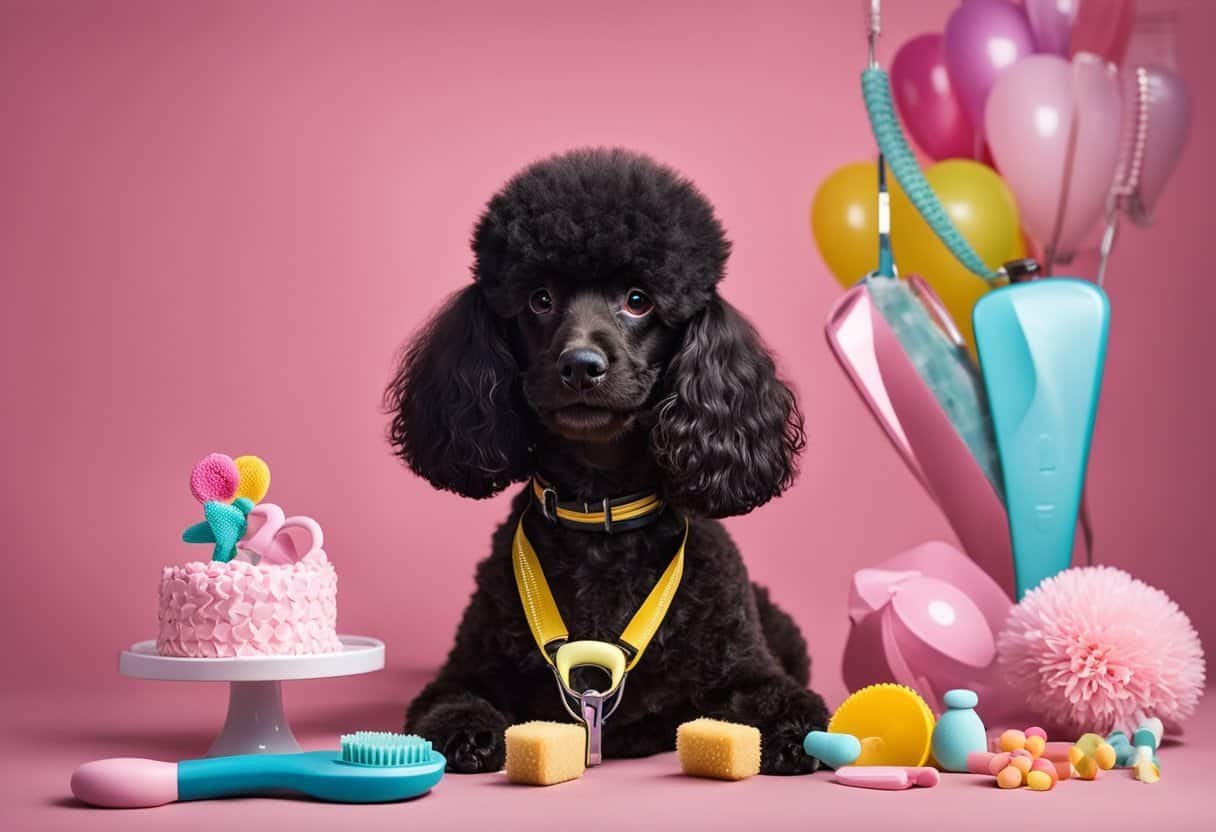
Proper healthcare and grooming are critical for your poodle’s well-being during their second year. At this stage, staying current with vaccinations, practicing consistent dental care, and mastering grooming techniques will contribute to your poodle’s overall health.
Vaccination Schedule
Your poodle needs to follow a specific vaccination schedule to maintain immunity against various diseases.
Between 15 and 24 months, your poodle may require booster shots for core vaccines, including distemper, rabies, and parvovirus.
Always consult your vet to tailor the vaccine schedule to your poodle’s health status and lifestyle.
Core Vaccines:
- Distemper: Booster needed
- Rabies: Booster as per local regulations
- Parvovirus: Booster if recommended
Dental Care
Maintaining good dental hygiene is crucial for preventing tartar buildup and dental diseases.
Brush your poodle’s teeth daily using canine toothpaste, and consider regular dental check-ups. Introduce chew toys designed to clean teeth and freshen breath as part of their dental care routine.
Grooming Techniques
Regular grooming ensures your poodle’s coat stays clean and tangle-free.
Familiarize yourself with brushing and combing procedures to prevent matting. Visiting a professional groomer might be beneficial for maintaining the correct coat and nail length.
In between professional grooming sessions, make sure to:
- Brush coat several times a week
- Trim nails as needed, usually every few weeks
- Clean ears to prevent infection
Effective Training Strategies
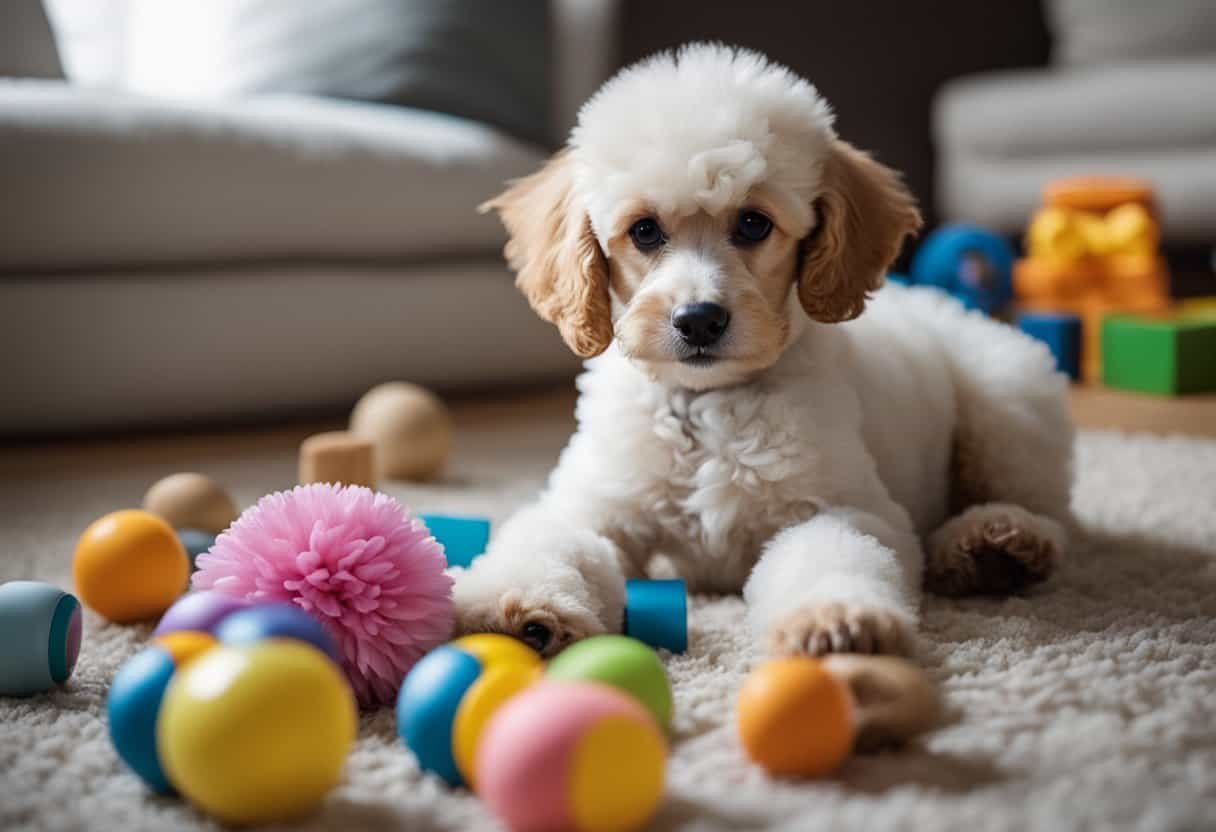
In your poodle’s second year, enhancing obedience and refining socialization are keys to a well-behaved adult dog. Harness these techniques to maximize the effectiveness of your training efforts.
Obedience Training Fundamentals
Start with Basic Commands: Reinforce the basics of sit, stay, come, and down. Consistency in practicing these commands is pivotal.
Positive Reinforcement: Reward your poodle promptly with treats or praise to reinforce good behavior, cementing the desired actions.
Use Training Techniques like clicker training or hand signals to add variety and effectiveness to your sessions.
Establish routine. Regular training sessions should become part of your daily schedule.
Behavior and Socialization Tips
Expose your poodle to a variety of environments, people, and other animals to foster adaptability and ease in social contexts.
Address undesirable behaviors early on. Implement appropriate corrective actions to guide your poodle gently but firmly.
Positive social experiences are crucial. Encourage friendly interactions by rewarding your poodle during and after socialization opportunities.
Crate and Potty Training
In the second year of your Poodle puppy’s life, crate and potty training can largely influence their behavior and happiness. Mastering these with clear routines and consistent reinforcement will set the stage for a well-adjusted adult dog.
Creating a Positive Crate Experience
To foster a positive association with the crate, begin by choosing a crate that’s of an appropriate size for your Poodle. This allows them to stand, turn around, and lie down comfortably.
Make the crate inviting by adding a soft bed and a favorite toy.
Start with short intervals in the crate and gradually increase the time as your puppy shows signs of comfort. Always remain calm and positive when placing them in or taking them out to reinforce crate time as a good experience.
- Offer treats and praise every time they enter the crate without hesitation.
- Keep the crate in a well-trafficked area of your home so they feel included even during “crate time.”
- Ensure it’s not used as a punishment, thus keeping their crate as a safe space.
Potty Training Success
Consistency is the cornerstone of effective potty training.
Implement a strict feeding schedule to predict bathroom needs and establish a routine.
Take your puppy outside to the same spot each time to help them understand where it’s appropriate to relieve themselves.
Use a clear command like “go potty,” and when they do, immediately reward them with praise or a treat.
- Maintain a routine schedule, taking them out first thing in the morning, after meals, during play, and before bedtime.
- Use positive reinforcement strategies like treats or clicker sounds to celebrate their potty successes.
- In case of accidents, clean up without punishment, as negative reactions can be counterproductive to their learning process.
Exercise, Play, and Stimulation
During the second year of your Poodle’s life, providing a balanced mix of exercise, play, and mental stimulation is crucial to their development and wellbeing.
Planning Activities and Games
To keep your Poodle’s body and mind engaged, plan a consistent daily routine of activities that are both physically demanding and mentally challenging.
Activities like agility training offer a dynamic way to burn energy and encourage cognitive development.
Incorporating a daily exercise schedule of 30 to 60 minutes will maintain optimal health and vitality for your adult Poodle. Split this into shorter sessions throughout the day and include a variety of games to keep their interest peaked.
- Sample Exercise Routine:
- Morning: 20-minute walk + 10 minutes of fetch
- Afternoon: 15 minutes of puzzle toys + obedience training
- Evening: 25-minute jog or swim session
Toys and Interaction
Select toys that stimulate your Poodle’s problem-solving skills and cater to their need for interaction.
Offer a mix of toys for solo and interactive play to ensure your Poodle is entertained even when you’re not around.
Durable chew toys, treat-dispensing puzzle toys, and tug-of-war ropes are all excellent options that can help in keeping your Poodle active and healthy.
Regular social interaction with you and other dogs will also contribute significantly to their emotional and social development.
- Recommended Toys:
- Solo Play: Kong Classic, Interactive Puzzle Feeders
- Interactive Play: Tug Toys, Floating Fetch Toys
- Cognitive Development: Hide-and-Seek Toys, Smart Puzzle Games
Understanding and Bonding with Your Poodle Puppy
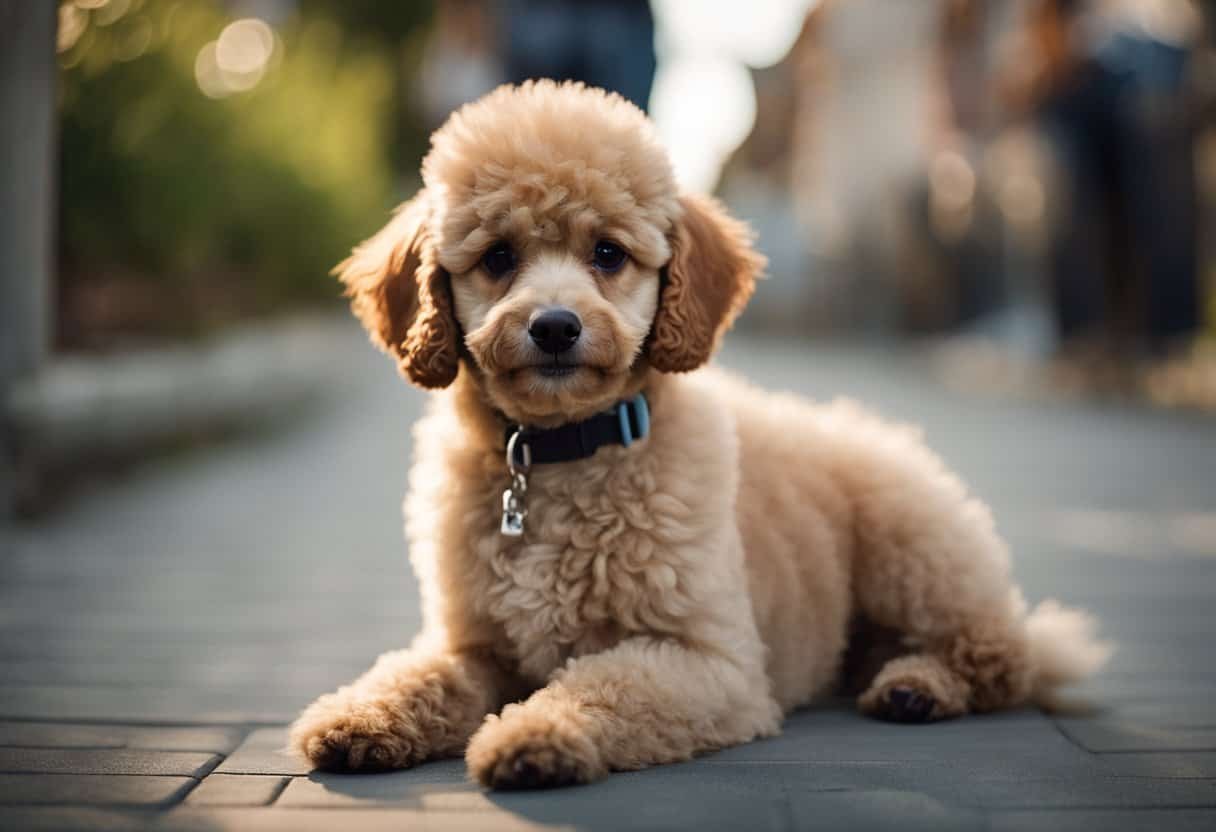
When raising your poodle puppy, establishing a deep bond of trust and love is essential, and early socialization plays a pivotal role in shaping their personality.
Establishing Trust and Love
Building a bond with your poodle puppy is founded on trust and love.
You create trust by consistently meeting your puppy’s needs and setting clear boundaries. Love is nurtured through gentle handling, regular playtime, and being attuned to their preferences.
Spending one-on-one time with your poodle is a significant factor in bonding, as they are known for their devotion and desire for companionship.
The Impact of Early Socialization
Early socialization impacts a poodle’s personality by exposing them to various people, animals, environments, and experiences, contributing to a well-adjusted and confident adult dog.
By introducing your puppy to new situations in a controlled and positive manner, you lay the groundwork for an adaptable and social dog.
Your poodle’s ability to form strong bonds and interact socially relies heavily on these formative experiences.
Preparing for the Transition into Adulthood
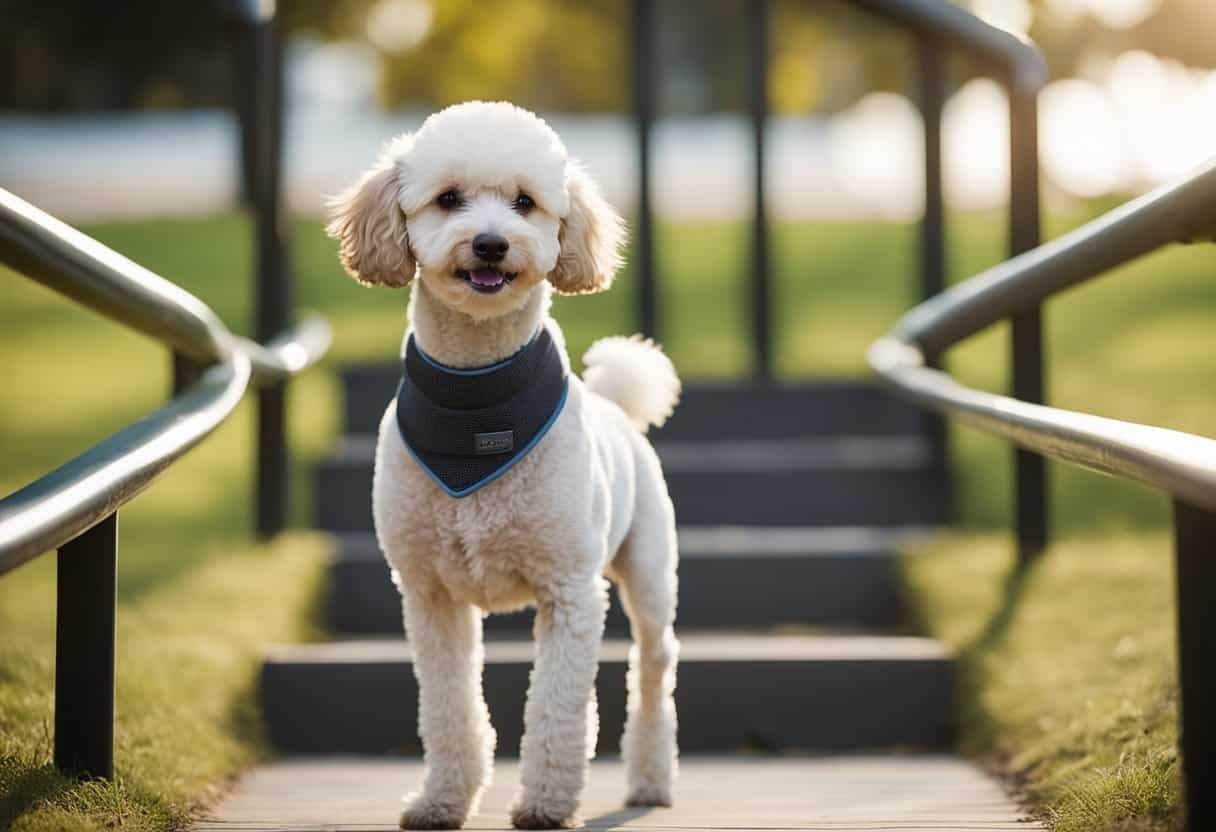
As your Poodle approaches their second year, they are transitioning into adulthood. This period involves changes in their needs and temperament, requiring adjustments to their care routine.
Adapting to Your Poodle’s Maturing Needs
Your Poodle’s transition into adulthood signifies important changes in their physical and emotional needs.
As they mature, you’ll notice their energy levels possibly evening out, requiring adjustments in daily exercise.
Ensure their diet reflects their adult status; it should be balanced to maintain a healthy weight and support a maturing body.
Poodles typically reach their full size between 15 to 24 months. This growth should be monitored and supported with appropriate nutrition and exercise to avoid joint issues.
Mental stimulation remains essential, so incorporate interactive toys and obedience training to keep their intellect sharp.
During this phase, you might also observe a shift in temperament.
Poodles are intelligent and sensitive dogs; your approach to training may need to evolve as they develop a more pronounced personality.
Consistency in rules and routines is key to helping them understand their place in the family and what is expected of them.
Frequently Asked Questions
As your Poodle puppy enters its second year, you’ll notice changes in size, behavior, and abilities. Understanding these transitions is key to providing the right care and training.
What are the developmental milestones for a 2-year-old Poodle?
By the age of two, your Poodle should have reached full physical maturity. This includes reaching their full size and having a well-developed coat. Cognitive development is also significant, with enhanced learning and problem-solving abilities.
How much exercise should a 2-year-old Poodle get daily?
A 2-year-old Poodle needs consistent daily exercise to maintain health and happiness. An active lifestyle including walks, playtime, and agility training should be adapted to their age and size, aiming for at least one hour of physical activity each day.
What are some effective potty training tips for a Poodle in its second year?
Consistency is critical for potty training your Poodle. Take your dog outside at regular intervals, especially after meals or naps, and use a specific command to encourage them to go. Rewards for successful elimination reinforce good behavior.
How can I prevent my 2-year-old Poodle from biting?
Biting can be mitigated by providing appropriate chew toys and engaging in constructive play that doesn’t involve hands or feet. Obedience training using positive reinforcement helps establish your role as the pack leader, reducing biting tendencies.
At what age can I expect my Poodle to start calming down?
Poodles generally begin to show signs of calming down after their energetic puppy phase. This can be around 18 months to 2 years.
Though individual temperaments vary, continued training and socialization during this period foster a more relaxed adult behavior.
How many hours of sleep does a 2-year-old Poodle typically need?
A 2-year-old Poodle generally requires around 12 to 14 hours of sleep per day. This rest is essential for their overall health. It also supports their active lifestyle during waking hours.
Ensure your Poodle has a quiet and comfortable sleeping area.

